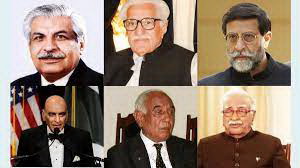Guiding the Ship
Understanding the Role of Caretaker Government in Pakistan’s Democratic Process
A caretaker government, also known as an interim government, is a temporary government that is formed during the transition period between the dissolution of the National Assembly and the formation of a new government in Pakistan. The main purpose of a caretaker government is to ensure the conduct of free and fair elections, maintain law and order, and provide continuity of governance during this period.
In Pakistan, the caretaker government is typically composed of non-partisan individuals who are appointed by the President of Pakistan. These individuals are typically retired civil servants, retired judges, or other independent and neutral individuals who are not affiliated with any political party. This is done to ensure that the caretaker government is non-partisan and can conduct free and fair elections without any bias or interference.
The role of the caretaker government in the democratic process of Pakistan is critical. They are responsible for making arrangements for polling stations, providing security for voters and electoral officials, and counting and announcing the results of the election. They also have the responsibility of maintaining law and order during the election period, and taking action against any attempts to disrupt the electoral process.
In addition to these responsibilities, the caretaker government also plays a vital role in providing continuity of governance. This includes ensuring that the day-to-day operations of the government continue without interruption, and that essential services such as electricity, water, and healthcare are maintained. They also ensure that the budget and financial management of the country are not affected during this transition period.
Overall, the concept of a caretaker government in Pakistan is an important aspect of the democratic process. It allows for a smooth transition of power between governments, and ensures that the rights of citizens are protected and upheld during the election period. The caretaker government is also responsible for ensuring that the electoral process is conducted in a free and fair manner, which is crucial for maintaining the legitimacy and stability of the country’s democratic system.
Selection procedure of the caretaker Prime Minister

The selection procedure of the caretaker Prime Minister in Pakistan is outlined in the Constitution of Pakistan. The outgoing Prime Minister is required to forward the name of the person to be appointed as caretaker Prime Minister to the President, unless otherwise directed by the President. The President then appoints the caretaker Prime Minister after consultation with the outgoing Prime Minister and the Leader of the Opposition in the National Assembly.
Read also: Pakistan’s Educational Problems | Pakistan Affairs Notes
Once the names have been presented, the President has the discretion to appoint any one of the proposed candidates as the caretaker Prime Minister. The President’s decision is final and cannot be challenged in any court of law.
It’s worth noting that the criteria for selecting a caretaker Prime Minister are not specified in the Constitution, but the tradition is to pick a retired judge, retired civil servant or a technocrat with a non-partisan background.
The appointment of a caretaker Prime Minister is typically done a few weeks before the end of the National Assembly’s tenure. The caretaker Prime Minister is appointed for a period of up to 90 days, during which time general elections are held and a new government is formed.
The caretaker Prime Minister is typically an independent and neutral individual, such as a retired civil servant or a retired judge, who is not affiliated with any political party. This is done to ensure that the caretaker government is non-partisan and can conduct free and fair elections.
It’s worth noting that this selection process has been subject of criticism from different political parties in the past, as they believed that the selection should be made through a consensus between the outgoing government and the opposition, rather than being appointed by the President.

Responsibilities of the caretaker government
The responsibilities of the caretaker government in Pakistan include:
Conducting free and fair elections:
The caretaker government is responsible for ensuring that the electoral process is conducted in a fair and impartial manner. This includes implementing measures to prevent voter fraud and ensuring that the electoral rolls are accurate.
Maintaining law and order:
The caretaker government is responsible for maintaining law and order in the country during the transition period between governments. This includes ensuring that the police and security forces are able to maintain peace and stability.
Providing continuity of governance:
The caretaker government is responsible for ensuring that the day-to-day operations of the government continue without interruption, and that essential services such as electricity, water, and healthcare are maintained.
Managing the budget and financial management of the country:
The caretaker government is responsible for managing the budget and financial management of the country during the transition period between governments.
Read also: The 5 Biggest Dams in Pakistan
Monitoring the performance of the outgoing government:
The caretaker government is responsible for monitoring the performance of the outgoing government and taking action against any attempts to misuse public resources or create an uneven playing field for the upcoming elections.
Representing the country internationally:
The caretaker government is responsible for representing the country internationally during the transition period between governments.
Maintaining Political neutrality:
The caretaker government is typically composed of non-partisan individuals who are appointed by the President of Pakistan, such as retired civil servants or retired judges, to ensure that the caretaker government is non-partisan and can conduct free and fair elections without any bias or interference.
Check also: Pakistan Affairs MCQs
Criticisms

The selection procedure of the caretaker Prime Minister in Pakistan has been subject to criticism and concerns from different political parties and stakeholders. Some of the main criticisms and concerns raised about the current process include:
Lack of transparency:
The current process for selecting the caretaker Prime Minister is not transparent and lacks clear criteria for selection. This has led to concerns that the process is open to manipulation and political interference.
Lack of consensus:
The process for selecting the caretaker Prime Minister relies on the outgoing Prime Minister and the Leader of the Opposition to provide names to the President, but there is no requirement for them to reach a consensus. This has led to concerns that the process is open to political maneuvering and manipulation.
Biased appointments:
Critics argue that caretaker Prime Ministers are often appointed based on political considerations, rather than their qualifications or neutrality. This has led to concerns that the caretaker government may not be impartial and may not be able to conduct free and fair elections.
Limited role of parliament:
The current process does not involve the parliament in the selection of caretaker Prime Minister, which is seen as a democratic deficit.
Potential reforms to the process include:
Increasing transparency:
The process for selecting the caretaker Prime Minister could be made more transparent by clearly outlining the criteria for selection and making the process open to public scrutiny.
Encouraging consensus:
The process for selecting the caretaker Prime Minister could be reformed to require a consensus between the outgoing Prime Minister and the Leader of the Opposition, or involving other parliamentary political parties in the process.
Appointing neutral figures:
To ensure that the caretaker Prime Minister is impartial and neutral, the process could be reformed to require the appointment of a retired civil servant, retired judge, or other non-partisan figure.
Involvement of parliament:
A parliamentary committee could be formed to vet the proposed names from the Prime Minister and the Leader of the Opposition, and make a final recommendation to the President.
It’s worth noting that these are potential solutions and there are different opinions on how to reform the process, but the key objective of any reforms should be to ensure that the selection process is transparent, impartial, and inclusive of all political parties.
Additionally, some have also suggested that the caretaker government should have a more active role in governance, such as monitoring the performance of the outgoing government and taking action against any attempts to misuse public resources or create an uneven playing field for the upcoming elections.
Overall, while the caretaker government plays an important role in ensuring the stability and smooth functioning of the country during the transition period between governments, it is important that the selection process for the caretaker Prime Minister is fair, transparent and inclusive of all political parties. This will ensure that the caretaker government is able to conduct free and fair elections, maintain law and order, and provide continuity of governance without any political bias or interference.
In conclusion, the role of the caretaker government in Pakistan is vital in ensuring the stability and smooth functioning of the country during the transition period between governments. The caretaker government, composed of non-partisan individuals, is responsible for conducting free and fair elections, maintaining law and order, and providing continuity of governance during this period. The selection procedure of the caretaker Prime Minister, although outlined in the Constitution, has faced criticism for lack of transparency and lack of consensus among different political parties. However, potential reforms to the process, such as increasing transparency, encouraging consensus, appointing neutral figures, and involving parliament, could help address these issues and ensure that the selection process is fair, transparent, and inclusive of all political parties. It is important that the caretaker government is able to conduct free and fair elections, maintain law and order, and provide continuity of governance without any political bias or interference, to ensure a smooth transition of power and stability of the country.
Some famous caretaker Prime Ministers of Pakistan
There have been several caretaker Prime Ministers of Pakistan since the country’s inception in 1947. Here are a few notable examples:
- Moeen Qureshi – He was the caretaker Prime Minister of Pakistan from July 18, 1993 to October 19, 1993. He was a career civil servant and economist, who later served as the Vice President of the World Bank.
- Malik Meraj Khalid – He was the caretaker Prime Minister of Pakistan from November 5, 1996 to February 17, 1997. He was a senior politician and served as the Speaker of the National Assembly of Pakistan.
- Muhammad Mian Soomro – He was the caretaker Prime Minister of Pakistan from November 15, 2007 to March 25, 2008. He was a senior politician and served as the Chairman of the Senate of Pakistan.
- Nasir-ul-Mulk – He was the caretaker Prime Minister of Pakistan from June 1, 2018 to August 18, 2018. He was a retired judge and served as the Chief Justice of Pakistan.
- Hassan Askari Rizvi – He was the caretaker Prime Minister of Pakistan from June 1, 2018 to August 18, 2018. He was a retired General and served as the Governor of Punjab.
These are just a few examples of caretaker Prime Ministers of Pakistan, many other figures have also served as caretaker Prime Minister in the past. The appointment of caretaker Prime Minister is done keeping in mind the neutrality and impartiality of the individual, and their capability to conduct free and fair elections.








[…] Read also: Understanding the Role of Caretaker Government in Pakistan’s Democratic Process […]